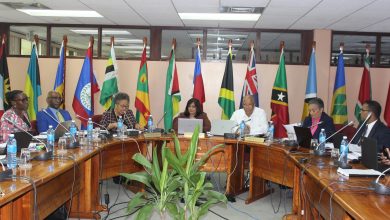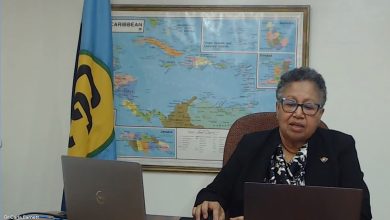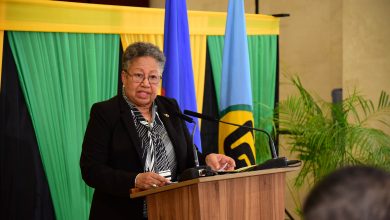CARICOM Secretary-General Ambassador Irwin LaRocque accepted the Letters of Credence from the new Austrian Ambassador to the Caribbean Community on Wednesday and delivered the following remarks:
Your Excellency, I am honoured to accept your Letters of Credence and to extend congratulations to you on your second tour of duty as the Plenipotentiary Representative of the Republic of Austria to the Caribbean Community (CARICOM).
I am pleased to welcome you once again to the Headquarters of the Caribbean Community and look forward to our continuing to work together to strengthen the excellent relations between Austria and CARICOM. This would further the meaningful and productive dialogue our countries have fostered over the years.
Ambassador Feldmann, as you are no stranger to us, you possess a first-hand appreciation of the beauty and diversity of our Region, as well as, its myriad opportunities and distinct challenges.
This year we celebrate 17 years of cooperation between CARICOM and Austria. This is a friendship built on bilateral relationships with the Member States of the Community, as well as through bi-regional dialogue and cooperation between CARICOM and the countries of the European Union of which Austria is a part.
I look forward to signing with you, in a short while, a Memorandum of Understanding that focusses on Disaster Prevention and Disaster Risk Reduction, as well as, Renewable Energy and Energy Efficiency. Both of these areas are related to climate change and are all the more relevant to the Region with every passing day. Austria is already involved with us in the latter area, as a partner in the establishment of the Caribbean Centre for Renewable Energy and Energy Efficiency (CCREEE).
Excellency, your appointment comes at a time when this years’ extremely active hurricane season has devastated a number of our Member States leaving a heavy toll of death and destruction. With the passage of Hurricane Irma followed most recently by Hurricane Maria, the reality of climate change has been visited upon us and further demonstrated the clear and present danger it poses to our existence.
Irma devastated Barbuda, (the sister isle of Antigua and Barbuda) the British Virgin Islands, Turks and Caicos Islands, and Anguilla, as well as St. Marten and St. Barts. The islands of Barbuda, Tortola and Josh Van Dyke were left in ruins.
Irma also caused significant damage in The Bahamas and Haiti and affected St Kitts and Nevis.
The hurricane resulted in 10 deaths among CARICOM Member States and Associate Members as well as a preliminary estimate of two billion dollars (US) in losses.
Just over two weeks later Maria struck and left massive destruction in Dominica. The destruction is unparalleled. It accounted for 27 deaths; more than 30 missing; 95% of the island's buildings damaged or destroyed; nearly all vegetation blown away, decimating the island's lush rainforests. The agricultural sector is completely destroyed. The hospital, the main hotels, the commercial centre, roads, bridges, communications infrastructure all suffered in varying degrees. The cost of the damage could run into billions of dollars.
The Region has been hit by two category five hurricanes within two weeks. That is unprecedented.
Hurricane Maria went from a category 1 to a category 5 in less than 36 hours. That is also unprecedented.
Excellency, we recognise that reconstruction demands an intense focus on economic, environmental and social resilience. In addition to restoring physical transportation and communication infrastructure, we will have to develop and enforce building codes and regulations to ensure that any future damage from hurricanes, and other natural disasters is as minimal as possible.
There is, therefore, a heightened sense of urgency to advocate for meaningful assistance to help in the reconstruction of our countries, with an emphasis on the resilience needed to mitigate the effects of these disasters.
There is no doubt that climate change is upon us. This demands more concerted and aggressive global action to address global warming.
It has been established that Small Island and low-lying coastal Developing States (SIDS), such as those comprising CARICOM, are the least of the contributors to global warming, the major factor in climate change. Yet, we bear the brunt of the impact.
Our Member States confront burdensome debt incurred in large measure by the demands of reconstruction after climatic events such as those experienced in recent weeks.
Further, Ambassador, I am sure that you are aware of the use, by several of our development partners of GDP per capita, as the primary criterion to determine a country’s access to development financing. We have long advocated against this grossly inadequate, and inaccurate criterion which has resulted in the graduation of most of our countries from access to concessional development financing.
We believe that this as applied to SIDS must be changed as a matter of urgency to include the concept of vulnerability.
In this regard, we urge our friends in the international community, including Austria, to lend their strong support to our efforts to effect that change.
In addition to our vulnerability we also experience economic discrimination. As we seek to diversify our economies and build our services sector, some of our Member States, engaged in financial services, have been labelled as “non-cooperative tax jurisdictions”
This is despite the fact that the countries in question are not so designated by the relevant global authorities, such as the Financial Action Task Force and the OECD Global Forum.
A cause for even more concern is the decision earlier this year, by the European Union Council, to screen some of our Member States to determine whether they are co-operative tax jurisdictions using new criteria.
The stated criteria go beyond the generally accepted international tax transparency, and accountability standards which our countries have been meeting over the past several years.
A major consequence of this “blacklisting” is the “de-risking” strategies being employed by certain international banks. This has resulted in the withdrawal of crucial correspondent banking relationships.
Austria, as a member of the EU, can assist us, by encouraging their fellow Member States to be guided by the informed position of the relevant global regulatory authorities, and desist from their unnecessary punitive actions.
Excellency, given your experience of the Region, we see you as a source of influence in promoting awareness about the extent of our capabilities, and the limitations we face in our aspirations for economic development.
Welcome back to the Caribbean Community, and my best wishes for an even more successful tenure in this term as the Plenipotentiary Representative of Austria to CARICOM. I assure you of my full support and that of the staff of the Secretariat as we work together to strengthen the bonds between the Caribbean Community and Austria.







